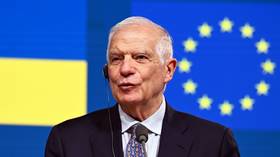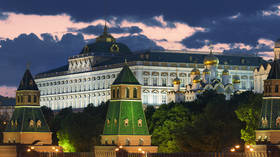EU’s Borrell warns of Ukraine funding vacuum if US stops spending

The EU would have to be “more creative” about providing additional funding to Ukraine if the US cuts support, the bloc’s foreign policy chief, Josep Borrell, has said in an interview with the Spanish Sud Ouest news outlet published on Wednesday.
According to the diplomat, if Washington were to halt funding for Ukraine, the situation would become “very complicated” because the EU would not be able to easily put $50 billion on the table in addition to what it is already sending to Kiev.
He noted that such a large sum of money could be provided “if there was political will” among member nations but added that a “sense of urgency in Europe only exists when the problem is near.” To remedy that, Borrell suggested raising awareness within the bloc and increasing its preparedness and capacity to respond.
Ahead of a debate this Thursday on how to bolster EU spending on Ukraine’s defense, Borrell proposed using the profits generated by Russia’s frozen central bank reserves to support Ukraine militarily.
The bloc would reportedly use 90% of the revenues to procure arms for Ukraine, while the remaining 10% would be transferred to the EU budget to be used to support Kiev’s defense industry.
He explained to Sud Ouest that the income from these assets could amount to some €3 billion ($3.25 billion) per year, which he admitted is “not extraordinary, but it’s not negligible.”
“With this, the Russians will not be very happy,” Borrell added.
Moscow reacted to the diplomat’s proposal by warning that such a move would lead to disastrous consequences for the bloc. Kremlin spokesman Dmitry Peskov stated that Borrell’s plan is “another statement in the spirit of moving towards the destruction of the legal foundations of European and international law” and cautioned that such a move would cast serious doubts on the EU’s commitment to the principle of asset immunity.
The spokesman also warned that all EU nations and officials that back Borrell’s plan would be subject to “legal prosecution for many decades to come.”
Following the launch of Russia’s military operation in Ukraine, Western countries imposed a series of wide-ranging sanctions on Moscow and froze some $300 billion worth of foreign assets belonging to Russia’s central bank. Of these funds, more than $200 billion are currently being held in the EU.
Russian officials have repeatedly denounced the blocking of these funds as “theft” and warned that any attempts to seize its assets would be met with a tit-for-tat response.













